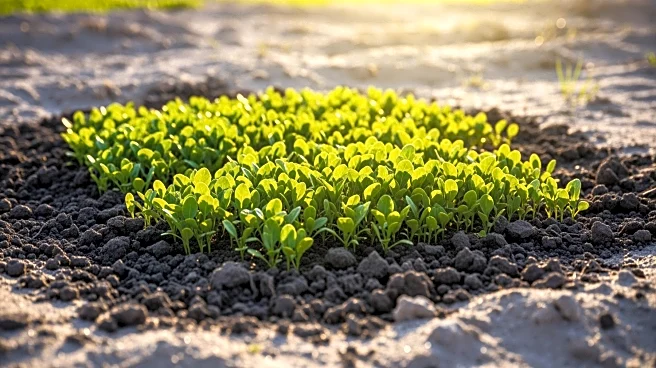What's Happening?
Israel has achieved a remarkable agricultural transformation by utilizing desalination, drip irrigation, and wastewater reuse to cultivate productive farmland in its desert regions. Despite over 60% of
its territory being desert and facing significant water scarcity, Israel has developed advanced technologies to ensure sustainable agriculture. Desalination has become a critical component, providing a substantial portion of the country's drinking water and enabling high-precision farming. The government treats water as a national security issue, implementing strict quotas and promoting water-saving technologies. Additionally, Israel has pioneered the use of drip irrigation, which delivers water directly to plant roots, significantly increasing productivity and reducing resource use. The country also invests in developing heat-resistant seeds and utilizes recycled wastewater for irrigation, further enhancing agricultural efficiency.
Why It's Important?
Israel's agricultural advancements have significant implications for global food security and sustainable farming practices. By transforming arid land into productive farmland, Israel sets a precedent for other countries facing similar environmental challenges. The technologies developed, such as desalination and drip irrigation, offer solutions to water scarcity and can be adapted to various climates worldwide. This innovation not only boosts Israel's economy through exports but also positions the country as a leader in agricultural technology. The success of these methods demonstrates the potential for sustainable agriculture to thrive in harsh environments, providing a model for other nations to follow in addressing food production and resource management challenges.
What's Next?
Israel's continued investment in agricultural technology and water management is likely to expand its influence in global agricultural practices. The country may further develop its export markets, sharing its expertise and technologies with other nations facing similar environmental constraints. As climate change intensifies, the demand for sustainable farming solutions will grow, potentially leading to increased collaboration between Israel and other countries. Additionally, ongoing research and development in seed genetics and irrigation methods could yield even more efficient agricultural practices, further enhancing productivity and sustainability.
Beyond the Headlines
Israel's agricultural transformation highlights the ethical and environmental dimensions of resource management. The country's approach to treating water as a national security issue underscores the importance of sustainable resource use in ensuring long-term food security. By prioritizing water-saving technologies and recycling wastewater, Israel sets an example for responsible environmental stewardship. This focus on sustainability not only benefits the local ecosystem but also contributes to global efforts to combat climate change and preserve natural resources. The integration of renewable energy in desalination processes further emphasizes the potential for environmentally friendly solutions in agriculture.








